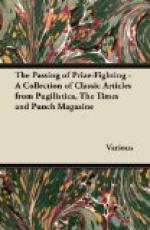* * * * *
In the first of the three stories, each about a hundred pages in length, which make up Gold and Iron (HEINEMANN), it is hard to escape the conviction that Mr. JOSEPH HERGESHEIMER between the lines, “So you thought that CONRAD was the only JOSEPH who could throw a man and woman together on a mysterious coast in the most strangely romantic circumstances, and provide a thoroughly groolly scrap into the bargain. Well, here’s another little Victory for you.” He seems definitely to challenge that air of the extraordinary and the inevitable combined which Mr. CONRAD so subtly conveys. It is a big effort, and I don’t feel that the author quite brings it off, yet I cannot think of anyone but Mr. CONRAD who would have come nearer to doing so, and the fight in the dark in this story is one that even after the War will make a reader catch his breath for half-a-dozen pages at least. In the second and third stories, which actually deal with gold and iron (the first of the three is called “Wild Oranges,” though perhaps “Blood Oranges” would have been a better title), the writer returns to a happier metier, and deals with an America remarkably interesting and wholly novel to me, an America where foundries and railways are in their infancy and crinolines are worn. Saloons, bowie knives and bags of gold-dust are all too familiar to us, but who, on this side of the Atlantic at any rate, ever remembers the quiet towns with Victorian manners to which the diggers belonged and returned? Both “Tubal Cain” and “The Dark Fleece” are excellent yarns and wonderful pieces of pictorial reconstruction as well.
* * * * *
After reading The Searchers (HODDER AND STOUGHTON), I seriously think of myself joining His Britannic Majesty’s Secret Service. All the fun and firearms, and ever, at the conclusion, a startling surprise for your friends and admirers, among whom you stand cool, calm and collected. Anthony Keene-Leslie did not deceive me when, upon his first introduction as a secret servant, he modestly disclaimed the thrills and excitements commonly attributed to his trade. I knew that many pages would not be turned before he would land us in the middle of some crimson intrigue; mysterious strangers, disguises, cryptic and invaluable




